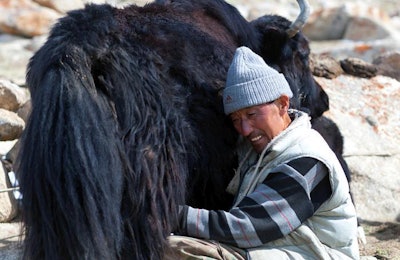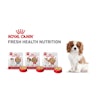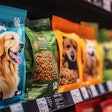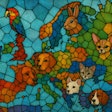
The novel coronavirus (COVID-19) knows no boundaries as it cripples even businesses located high up in the Himalayas, where Nepali farmers turn milk from yaks (domesticated wild ox) into hard cheese called churpi and sold as nutritious dog chews all over the world.
Because of months-long lockdowns, production and shipment of churpi dog chews have been severely affected. Godawari International Private Limited, one of the largest processors of churpi and based in Kathmandu, Nepal, said their operations have been disrupted by the lack of international flights to send their premium dog chews abroad.
Shipping the most significant pandemic issue
“We had almost 90 days of lockdown where we could not work,” Mohindra Singh Judge, CEO of Godawari, said in mid-July 2020. “Also, as all our shipments are done via air, we have not been able to ship at the moment because the international flights are suspended.”
Godawari International exports its churpi worldwide, particularly to Japan, Canada, India, Taiwan and the United States. A large network of farmers and micro dairies from the eastern Himalayas sell their churpi to Godawari, which further processes the hard cheeses to refine them for the pet food market. Judge said they have not completely stopped manufacturing churpi even during the lockdown, but the lack of options to ship other than by air is their biggest pandemic-related business problem.
“The shipping cost is high due to limited flights available,” said Judge. “Although there are some chartered cargo flights, the rates are almost five times higher than normal and our clients are unwilling to buy at these inflated freight rates.”
While almost all sectors of the economy are affected by COVID-19, Judge said that government support for businesses in Nepal is minimal.
“We are struggling quite a lot though we have plenty of demand,” he said. “We are praying that we are able to overcome this pandemic.”
The churpi phenomenon
Churpi (also chhurpi), a delicacy throughout the villages in the Himalayan region, is made in part from skimmed milk from naks (female yaks), cows and local zebu cattle (chauris). Lime juice and salt are added when boiling the milk and the resulting curd is compressed into cloth molds, smoked and dried for almost a month to give it a unique flavor.
A stick of churpi contains a healthy level of omega-3 fatty acids and antioxidants, calcium, potassium, zinc, biotin, folic acid, iron, phosphorus, magnesium and sodium. In addition, churpi is a rich source of vitamins (A, B1, C, D, E and K).
For many generations, people in the Himalayan region have eaten churpi as a snack or like chewing gum. Also very fond of this hard cheese are dogs, which locals said would often steal churpis to gnaw on. In 2003, a Nepali entrepreneur saw a dog eating a churpi and it inspired him to form the company Himalayan Dog Chew with two other business partners. More churpi manufacturers followed suit and the export of churpis became a multi-million-dollar business.
Data from Nepal's Trade and Export Promotion Centre showed US$7 million worth of churpis were exported between 2017 and 2018.
But with COVID-19, which has so far infected 17,061 in Nepal and has caused 38 deaths as of July 14, 2020, the future of the churpi industry is becoming uncertain as the crisis drags on and international flights stay grounded.

















